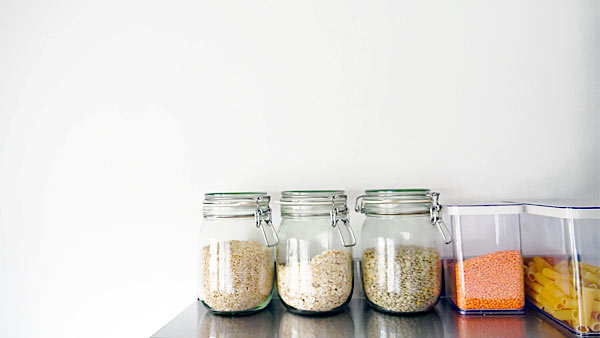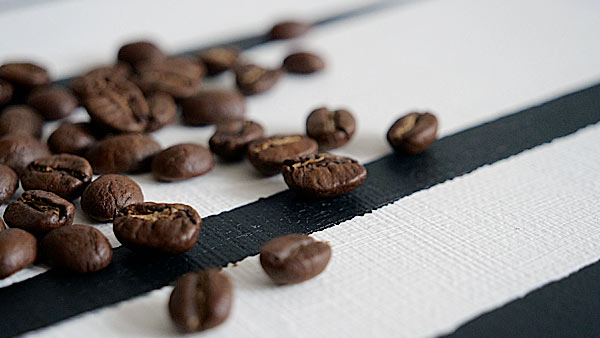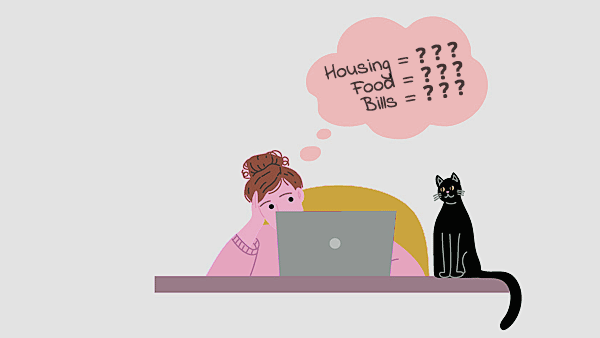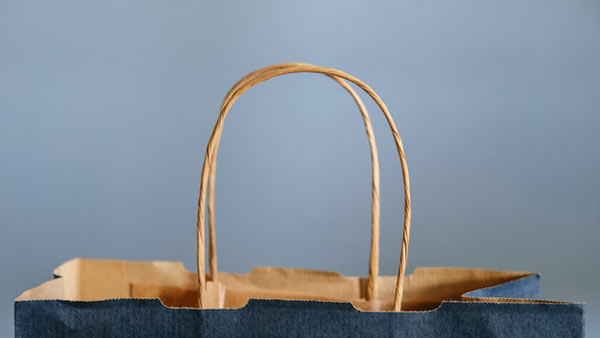Often, the advice to save money on groceries is to buy food in bulk when they are on offer and store them in the house. Or, to batch cook double or triple portions when preparing food and freeze the remainder. These are great ideas if:
- ample space and storage is available
- you have access to a fridge freezer
- you have a family or friends nearby to eat the oversupply
But what about those who do not have a pantry, enough space for a fridge freezer, are single, or a small household of 2-3 people?
A single household in the city where space is scarce will rarely have a standalone fridge freezer in the flat, nor a storage room for cans, tins and jars!
Therefore, there needs to be another way on how to save money on groceries!

So how to get started?
Know your money. It can be hard so save money when everything is getting more expensive. But if you know how much exactly you are spending now, you can then set a target for cutting costs. So, start noting all your food expenses down first before setting out to save money on groceries.
Run an expenditure investigation for a a month. Note down everything from food to drinks that you spend money on.
It is best to do this for a month just in case there are large deviations. Of course, shop as you usually do and don’t get horrified when you see the amount of money you spend on a weekly basis. This problem will get tackled next.
After these two weeks you should have a rough ball park figure, which probably repeats itself over and over. However, that figure is the base amount from which you decide how much you want to save.
Start small, change things gradually
In order to avoid a drastic lifestyle change, I recommend to set a goal of decreasing the spend by 20% per week to start with. This is not too crazy and likely will not result in huge lifestyle changes. But once you get into it, of course, you could try to decrease it further. It depends on what lifestyle you have at the moment and how willing you are to change your current spending habits. The more takeaway and convenience foods you buy at the moment, the more you could potentially save. The goal is not just to spend less but to also eat healthier overall. But also allowing yourself some indulgences in a controlled way. Sure, we all would like to eat chips and crisps whenever we can. But they are not good for us, nor is it good for us to eat takeaways all the time.
With saving, it’s a bit like going to the fitness studio. It’s hard, but it’s worth it. But that is life. Mostly everything in life that is hard is worth pursuing. Such things like easy, convenient and fast food work so well on us because that’s how our brain works. We want food immediately when we are hungry otherwise we get grumpy. Plus, food is the most effective master seducer.
However, it is possible to save money on groceries and become the master of our own finances.
Below is a list with some hopefully helpful and easy ideas on how to cut your grocery spending.
Buy vegetables and fruits that are in season
Fresh produce like vegetables and fruit are usually cheaper than processed foods. Buy lots of fruit and veggies when they are in season. This can be from the weekly market or supermarket. And while you are out shopping, look out for offers. Supermarkets usually have offers every week on some fruits and veggies when they are in season. Buy the items that are in season and on offer and you will save money on food.
Perhaps, this is even going to add more variety into your cooking, because, we often just buy the same stuff over and over because it is convenient. But, if tomatoes are on offer why not buy 1 or 2 kilos and make a nice tomato and onion salad as a side dish or a quick no cooking gazpacho? Get creative. I find that fruits and veggies are the most versatile ingredients there are. They go with everything and they perform well together. You can basically mix any type of veg together and it will taste great.
Avoid ready meals and convenience foods
Do not buy any ready meals or convenience foods. Ready meals are not only not as tasty as a home cooked meal but are also more expensive. Some of them are even quite bad for you. Too much salt, too much sugar, fat, and other strange sounding ingredients for which a chemistry degree is required to fully comprehend.
Convenience foods such as washed salad leafs in plastic, carrot sticks in plastic, fruits cut into bite size chunks, also in plastic are not only awful on our environment but they cost 5x more than the actual product. It is not hard to chop up a pineapple! If one has access to a sharp knife it takes exactly 2 minutes and a half. Then another 5 seconds to throw them into a container. There is actually no time saved buying these! Because if you go to the supermarket at lunch time to buy convenience, you’ll waste time! Instead, you could spend your lunch break walking in the park soaking up the sun while others queue up in a busy supermarket. Completely say no to processed and convenience foods, and soon you’ll hear the ka-ching, or rustling of surplus money in your purse or wallet.
Dried legumes are often better value than tinned produce
Instead of buying cans and tins of products, buy the dried version. Lentil, Beans, Chickpeas. A pack of dried chickpeas usually costs slightly more than a can but has 3x more content. Of course, they do take a little bit more preparation but, if you soak them overnight with a little bicarbonate soda to soften them up beforehand, cooking is actually quite quick.
Alternatively, puy and red lentils cook pretty fast and are very tasty. Having these dried ingredients at home means you will always have something on hand to cook pot luck. That will save you time and money in regard to top up shops.
Stop going for top-up shops completely
Do not do any top up shops. Period. Make your food last for at least 5 days. There is usually always something available at home. Especially, if you go shopping regularly. Avoid top up shops like the plague. They are rarely just top up shops and usually 3 or 4 additional items or more squeeze themselves miraculously into the shopping bag. All the while there is enough food at home. Make do with what you already have at home. Get creative, be imaginative.
Do one big shop per week
Shop once per week. Do a big shop, where you get everything that you might need for the week. Write a list of items along with 4-5 dinner ideas. Check if you have enough of the staples, such as pasta, tinned tomatoes, rice, dried beans and legumes, cereals, coffee, tea and milk. If you do not have a car and would have to use public transport, then shop online instead. Online grocery shopping does help to stick to the budget.
3 for 2 offers do not work for single or small households
Don’t buy into 3 for 2 offers on things like bread. In most cases these are great for a family of 4-5 people, or households with a fridge freezer. Don’t get lured into it because it looks like a great offer. Bread doesn’t keep that well and before you are able to finish it, it will go stale or mouldy. That goes for any baked products. Supermarkets overproduce or overbuy, then drop the price on them to get rid of them quickly before they approach their sell by date. Only get the amounts that you actually need and know are able to consume! Always.
Make double portions of food to take to work the next day
If you are used to buying a sandwich or some other ready-made meal for lunch while at work, try to limit this to only once or twice per week. Instead of buying takeout lunches, you could prepare an additional portion at dinner the day before to take with you to work instead.
Stock up on quick to prepare but tasty staples
Have things such as pasta or potatoes at home. They are not only incredibly cheap, but are one of those ingredients anyone can make shine with little else. Pasta with olive oil, garlic, with or without fresh herbs is delicious and requires little ingredients. A potato tortilla only needs an onion, oil and eggs and is super tasty and quick to make.
Check if cheaper alternatives of the same are available
Always choose the cheaper version of something. For example: get the cheaper oats. Sometimes even a supermarket brand organic version is cheaper than a branded non-organic version. Don’t just grab anything that is laid out in front of you. Inspect what is available and compare the price. This goes for everything. Another example is marmalade. The price on marmalade can range from 0.99 cents to 3-4 EUR per jar. These are huge differences and often the higher price does not mean that it tastes better.
Keep it simple during a busy work week and lavish at weekends
Cook simple, quick and cheap foods during weekdays. Examples are salads, soups and pasta with some veg that can be cooked within 30 mins. Reserve the more lavish and fancy cooking for weekends. This way, you save money but are also not feeling that you are missing out on something.
Get the help of an app to stay on top of your food shopping and meal planning
Save money on groceries by getting an app. There are more broader budgeting apps available, that can help you to budget all areas, but there are also specific groceries relates, such as AnyList. This way you will never forget to buy anything and more importantly are buying only what you need. Plan a week ahead and add to the list when you see that you are running out on things. Make it habitual. The upgraded version lets you add prices and different shops, so you would always know how much you are going to spend. It also has the option to add recipes and meal planning.
Limit your alcohol intake
Alcohol is incredibly expensive. If you happen to drink frequently, like 3 times or so per week, the cost is at least 20 EUR if you chose the cheaper wine for example. That adds up to 1040 EUR per year! Apart from not being healthy, it also leads to bad food choices because it increases the appetite for fatty and rich foods.
Cut down on meats and sausages
Processed meats such as sausages contain a lot of salt and can be quite expensive. You could use hummus, guacamole or nut butters as a spread for sandwiches instead, or make your own sandwich spread. If you eat meat a lot, you can save money by cutting back. Instead of consuming meat every day try to buy good quality meats from a trusted source and keep the meat consumption minimal to once or twice per week. It is better on the environment, better on the animals and potentially your mind (if you have been feeling bad or guilty about animal farming).
With small changes everyone can save money on groceries. All that is needed is dedication, comparing prices and creating a plan. Perhaps it’s a good idea to put the money that you save into a separate account. Then, every month you will see the funds grow. This will give you extra ammunition to continue on the money saving path. Think about what you could do with the money! Perhaps you could go on holiday, pursue a course, a hobby or saving up for bigger life changing purchases.
If you are interested in more money saving tips, then check out this article.









